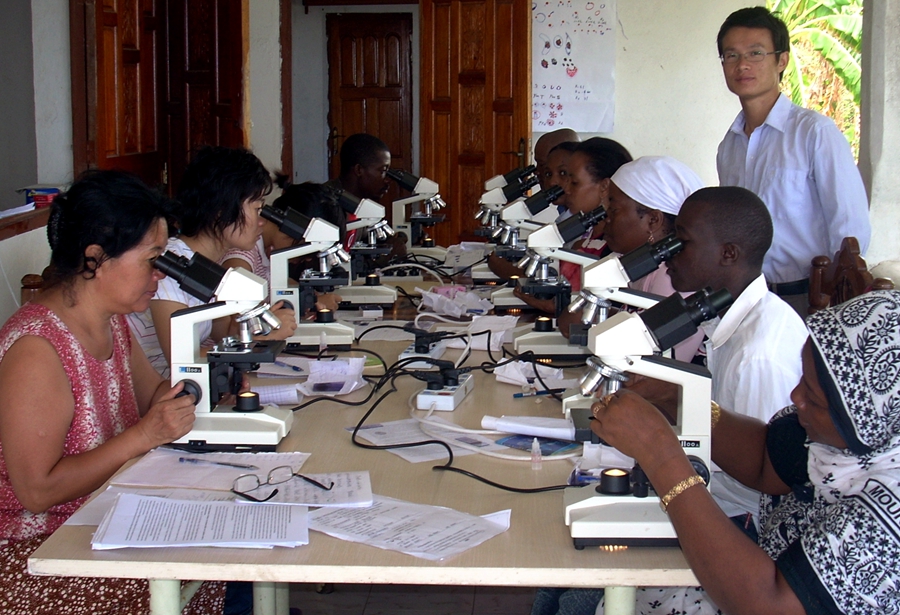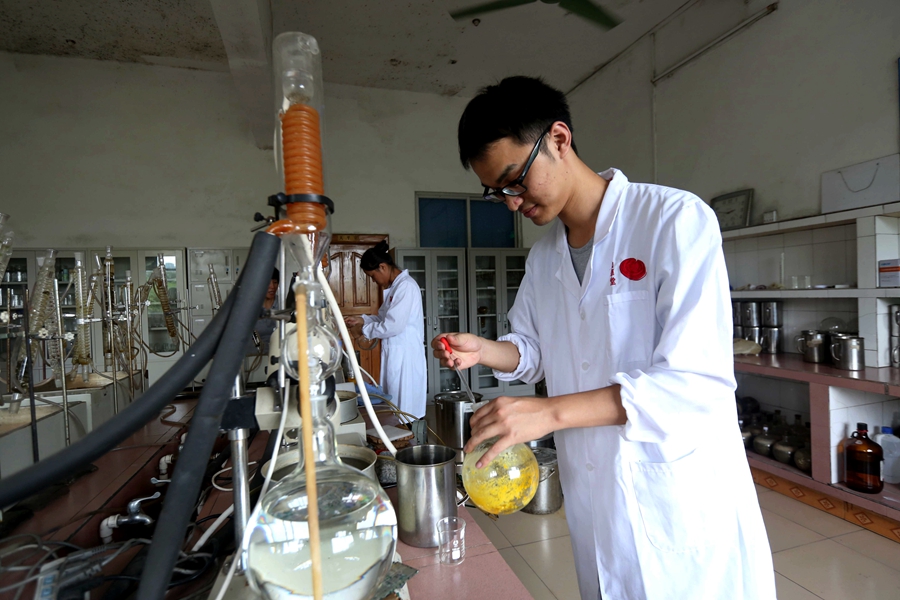Chinese expertise helps fight malaria in Comoros
Publisher:China Daily Time:2018-09-19Browse:1624 font size:【large】【middle】【small】
 Workers are trained to use microscopes in Moheli, one of three major islands of Comoros, in 2007.Provided To China Daily
Workers are trained to use microscopes in Moheli, one of three major islands of Comoros, in 2007.Provided To China Daily
A drug derived from TCM has almost eradicated the illness in the African island nation, as David Blair reports.
Until recently, malaria not only destroyed lives in the East African island nation of Comoros, but also devastated the economy. However, a team of Chinese doctors from Guangzhou University of Chinese Medicine, cooperating with the Comoran government, has almost eradicated the disease.
"In 2010, more than 103,000 people got malaria - one out of every eight people - and 54 died," said Affane Bacar, director of the National Anti-Malaria Project of the Ministry of Health of the Union of Comoros.
"Every year, more than 90 percent of families had someone who got malaria. If a family member gets the disease, they have to go directly to a health clinic at the hospital. Families had to pay around 40 percent of their annual income for this healthcare. It was a fortune," he said.
The team from Guangzhou University of Chinese Medicine in Guangdong province gave doses of Artequick, an artemisinin combination therapy, to a large portion of the population simultaneously, a technique known as mass drug administration. Artemisinin is a drug derived from traditional Chinese medicine.
By 2014, seven years after the program was introduced and then gradually expanded in Comoros, there were fewer than 2,000 cases of the disease and no malaria-related deaths in the country.
"Using the Chinese strategy, this disease has been solved, eliminated. Every family has saved a lot of money. The economic level of the country is not very rich. They can use this saved money to do other very, very important things - to develop their family, to give the children an education," Bacar said.
In 2016, there were an estimated 216 million cases of malaria and 445,000 deaths worldwide. Ninety-one percent of those deaths were in Africa, according to the US Center for Disease Control and Prevention. Malaria is also a serious problem in South Asia and parts of Southeast Asia.
More than 90 percent of the deaths from malaria are children age 4 or younger. On average, a child dies of malaria every 30 seconds in Africa, according to the World Health Organization.
Mass treatment
Traditional methods of dealing with malaria focus on mosquitoes - either trying to eliminate them or stopping them from biting people by using indoor spraying or distributing insecticide-infused sleeping nets. Mass drug administration, on the other hand, aims to eliminate the malaria parasite directly from the human population. Since malaria does not affect animals, eliminating it from humans can eradicate the disease.
"Our method is to use two to three rounds of mass drug administration to clear the parasites from a large portion of the human population, thus cutting the transmission cycle. Even though the mosquitoes exist, if the parasite is not carried by the population, the biting of mosquitoes will not transmit the disease," said Deng Changsheng, who was in charge of the program's fieldwork for eight years on two of Comoros' three major islands.
"The second point is that MDA (mass drug administration) is given to all the population, whether infected or not. The infected patients with low parasite levels may not have symptoms, but they are a source of infections. A successful MDA can clear parasites from the human population."
In 1974, Li Guoqiao, now chief professor at the Guangzhou University of Chinese Medicine, led the first clinical trial of artemisinin to treat outbreaks of malaria in the provinces of Yunnan and Hainan. Artemisinin cleared the parasites from the blood of malaria patients more rapidly than any other antimalarial drug.
Before going to Comoros, the team attempted to use a mass drug administration approach to fight malaria in a trial area in Cambodia. In three years, the malaria rate fell by 95 percent. However, it later went back up because the program did not cover a large enough portion of the population and the disease was reintroduced from outside.
In 2005, Li received an unexpected phone call. Cui Wei, a Chinese woman, had moved to Africa and settled in Comoros to try to get over her grief at the death of her only child. She saw Comoran children dying of malaria and wanted to help. Having read about Li's work in Cambodia, she called and asked him and his team to visit Comoros. In response, the team traveled to the country and established good relations with the Comoran government.
 A researcher in the Guangxi Zhuang autonomous region assesses a sample of artemisinin, a drug derived from traditional Chinese medicine that is used to treated malaria.Tan Kaixing / For China Daily
A researcher in the Guangxi Zhuang autonomous region assesses a sample of artemisinin, a drug derived from traditional Chinese medicine that is used to treated malaria.Tan Kaixing / For China Daily
Pilot program
The mass administration of artemisinin began in 2007 with a pilot program on the island of Moheli, the smallest of Comoros' three major islands, which had a population of 38,000 in 2006. It also had the highest rate of malaria. According to Bacar, more than 90 percent of the population had malaria.
"People from the other islands were afraid to go there," he said. By March 2008, Malaria cases had been reduced by 99 percent on the island, according to the Comoros Ministry of Health.
According to Deng, social mobilization at the grassroots level and training local workers was the key to the improvements.
"We did a lot of field work and operational work, which involved meeting with religious elders and teachers. We had to explain to them and convince them," he said.
The program was funded by the Chinese government, with medicine and medical care provided free to Comoran nationals.
The successful results in Moheli convinced the Comoran government to use the Chinese approach throughout the country.
By 2014, cases of malaria throughout the island nation had been reduced by 96 percent from the 2013 level and by 98 percent from the 2010 level, according to the Comoros Ministry of Health.
Song Jianping, a professor and director of the Institute of Tropical Medicine at Guangzhou University of Chinese Medicine, estimates that applying the strategy used in Comoros worldwide could be done for about $30 per person. Since there are about 1 billion people in malaria-infested areas, a preliminary estimate is that the disease could be eradicated from the world for a total cost of about $30 billion.
Ethical issues
There are some issues with mass drug administration. Ethical problems arise because healthy people are asked to take Artequick, which could cause side effects. Zheng Xie, from the Peking University Health Sciences Center, said she interviewed some people who said they had vomited after taking the drug, and one young man reported hearing loss, though Zheng said there is no evidence that Artequick caused these problems.
There is also concern that mass use could lead to artemisinin-resistant malaria, which has reportedly occurred in Southeast Asia. Another possible issue is that the Comoran population might lose its partial immunity and be vulnerable to malaria brought in from other countries.
Li said that a 98 percent reduction is not elimination, so mass drug administration should be combined with a test that detects malaria in real time.
Song said: "The method we are using now is based on more than 60 years of experience in China in the successful fight against malaria. We know that the differences between a developed and a developing country are very big. If the idea and the strategy are based on Western experts, it will be different from the reality of a developing country.
The success of mass drug administration using artemisinin in Comoros has convinced other countries, including Togo, Malawi and Papua New Guinea, that they should try the same approach. In 2015, Togo, in West Africa, contacted Guangzhou University of Chinese Medicine and asked it to start a project there.
Song said that Ikililou Dhoinine, Comoran president at the time, told him: "We have been using Western methods for more than 30 years now, and malaria is still in the country. So, I thought, why not try the Chinese method?"
For the Chinese team, the relationship with the people of Comoros is not a one-way street.
"When I think about Comoros, lots of good memories come into my mind. I gained friendship, sincerity and goodness from the people, and I experienced and know more about the enjoyment of life and significance of my work," Deng said.
Contact the writer at davidblair@chinadaily.com.cn
Source: China Daily
Link: http://www.chinadaily.com.cn/a/201803/23/WS5ab44f74a3105cdcf6513b92_1.html




More information